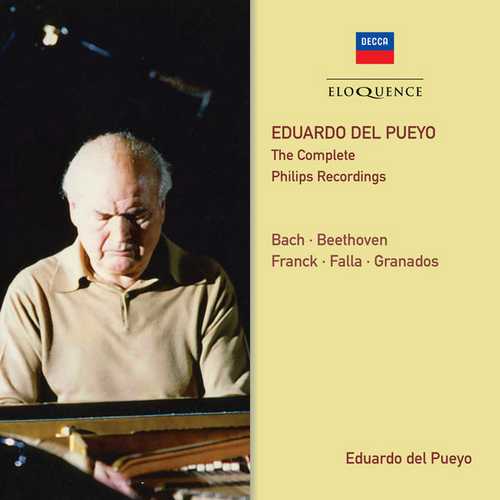
Composer: Johann Sebastian Bach, Ludwig van Beethoven, Manuel de Falla, César Auguste Franck, Enrique Granados
Performer: Eduardo del Pueyo
Orchestra: Orchestre des Concerts Lamoureux
Conductor: Jean Martinon
Format: FLAC (tracks)
Label: Eloquence
Catalogue: ELQ4840193
Release: 2019
Size: 977 MB
Recovery: +3%
Scan: cover
Franck: Prélude, Choral et Fugue, M21
01. 1. Prélude
02. 2. Chorale
03. 3. Fugue
Bach: Italian Concerto, BWV971
04. 1. (Allegro)
05. 2. Andante
06. 3. Presto
Bach: Partita No. 1 in B flat major, BWV825
07. 1. Praeludium
08. 2. Allemande
09. 3. Corrente
10. 4. Sarabande
11. 5/6. Menuet I – Menuet II
12. 7. Giga
Beethoven: Piano Sonata No. 21 in C major, Op. 53 ‘Waldstein’
13. 1. Allegro con brio
14. 2. Introduzione (Adagio molto)
15. 3. Rondo (Allegretto moderato – Prestissimo)
Beethoven: Piano Sonata No. 8 in C minor, Op. 13 ‘Pathetique’
16. 1. Grave – Allegro di molto e con brio
17. 2. Adagio cantabile
18. 3. Rondo (Allegro)
Beethoven: Piano Sonata No. 23 in F minor, Op. 57 ‘Appassionata’
19. 1. Allegro assai
20. 2. Andante con moto
21. 3. Allegro ma non troppo
Beethoven: Piano Sonata No. 18 in E flat major, Op. 31 No. 3 ‘The Hunt’
22. 1. Allegro
23. 2. Scherzo (Allegretto vivace)
24. 3. Menuetto (Moderato e grazioso)
25. 4. Presto con fuoco
Beethoven: Piano Sonata No. 14 in C sharp minor, Op. 27 No. 2 ‘Moonlight’
26. 1. Adagio sostenuto
27. 2. Allegretto
28. 3. Presto
Beethoven: Piano Sonata No. 26 in E flat major, Op. 81a ‘Les Adieux’
29. 1. Das Lebewohl (Adagio – Allegro)
30. 2. Abwesendheit (Andante espressivo)
31. 3. Das Wiedersehn (Vivacissimamente)
Beethoven: Piano Sonata No. 29 in B-flat major, Op. 106 ‘Hammerklavier’
32. 1. Allegro
33. 2. Scherzo (Assai vivace – Presto – Prestissimo – Tempo I)
34. 3. Adagio sostenuto
35. 4. Largo – Allegro risoluto
Granados: Danza española, Op. 37
36. No. 1 “Minueto”
37. No. 2 “Oriental”
38. No. 3 “Zarabanda”
39. No. 4 “Villanesca”
40. No. 5 “Andaluza”
41. No. 6 “Rondalla aragonesa”
42. No. 7 “Valenciana”
43. No. 8 “Asturiana”
44. No. 9 “Mazurca”
45. No. 10 “Danza triste”
46. No. 11 “Zambra”
47. No. 12 “Arabesca”
Granados: Goyescas (piano suite)
48. 1. Los requiebros
49. 2. Coloquio en la reja
50. 3. El Fandango del Candil
51. 4. Quejas ó la maja y el ruiseñor
52. 5. El amor y la muerte (Balada)
53. 6. Epilogo (Serenata del espectro)
54. 7. El pelele (Escena goyesca)
Falla: Noches en los jardines de España
55. 1. En el generalife
56. 2. Danza lejana
57. 3. En los jardines de la Sierra de Cordoba
A newly remastered, richly documented set celebrating the art of a Spanish Beethoven specialist recorded at the peak of his powers in the late 1950s, some of it released onto CD for the first time.
Born in Zaragoza in 1905, Eduardo del Pueyo left Spain in 1920 to enter the Paris Conservatoire, but rejected the teaching of Marguerite Long outright. In thrall to Beethoven’s genius in particular, he chose instead to become, as it were, a great-grand pupil of Franz Liszt through the example of Marie Jaëll, as passed down to Jeanne Bosch van’s Gravemoer. His playing is based on absolute respect for the musical text, shorn of false pathos but all the more sensitively expressive because the expressions flows from a lucid musical line. Del Pueyo brought freshly reconsidered cycles of the Beethoven sonatas to audiences across Europe in the late 1930s, and audiences (especially in Germany) thrilled to a Beethoven for their time, where everything was audible, and whose steely rigour set the composer free from sentimentality, much as Erdmann and Schnabel were doing in their own ways.
Del Pueyo recorded a complete Beethoven cycle much later in his career, but these Philips recordings of ten sonatas, mastered from the original tapes for CD, date from 1958 when, having settled in Brussels, he followed up naturally idiomatic accounts of Falla and Granados with an abortive cycle, beginning at the summit with the ‘Hammerklavier’. The urgency with which he launches into the imperious chords at the opening are a good indication of where radical playing immediately places the listener: this is Beethoven playing that really counts for something.
Del Pueyo closed his Philips contract in 1960 with Franck and Bach: a poised, radiant and simple account of the Italian Concerto, and a First Partita concluding with a remarkable account of the Gigue where he barely seems to touch the keyboard. It sets the seal on another piano release of exceptional historical significance from Eloquence.